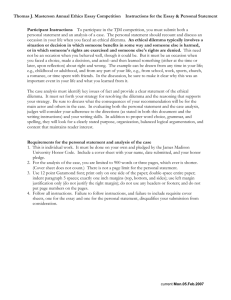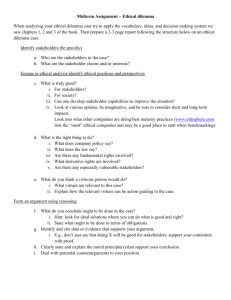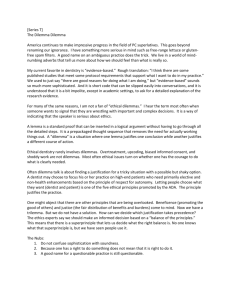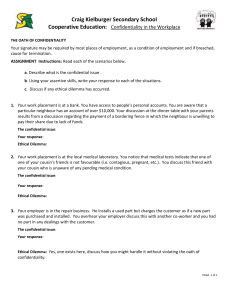Kidder's Checkpoints for Ethical Decision-Making
advertisement
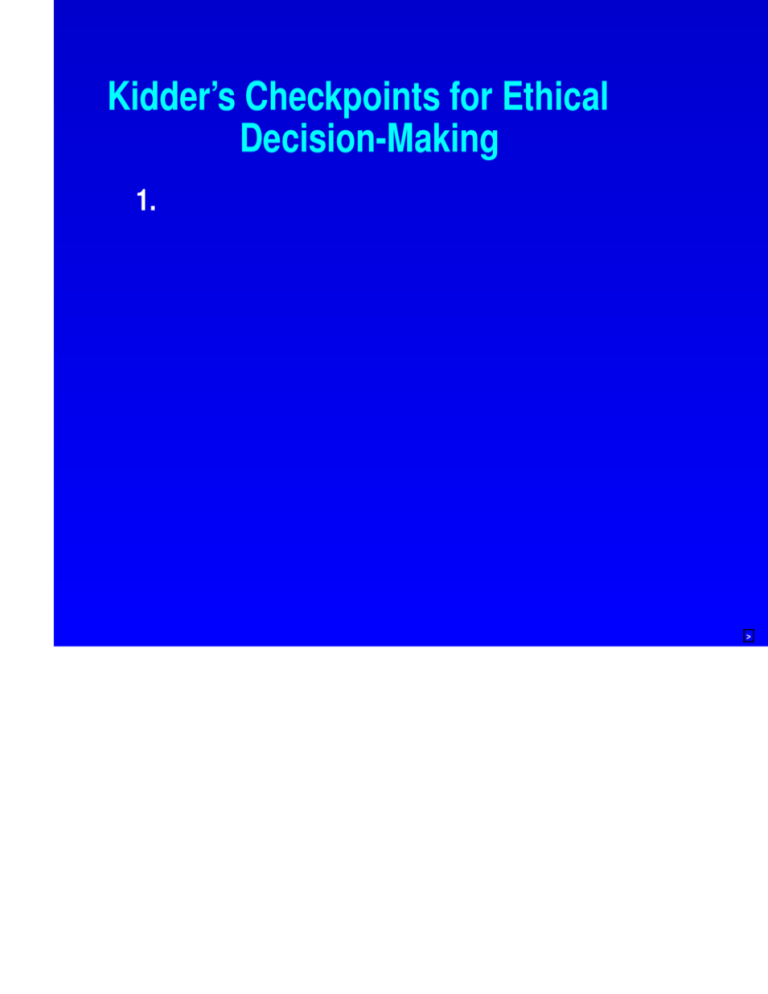
Kidder’s Checkpoints for Ethical Decision-Making 1. > Kidder’s Checkpoints for Ethical Decision-Making 1. 2. Is there an ethical dilemma? > Kidder’s Checkpoints for Ethical Decision-Making 1. 2. 3. Is there an ethical dilemma? Whose dilemma is it? > Kidder’s Checkpoints for Ethical Decision-Making 1. 2. 3. 4. Is there an ethical dilemma? Whose dilemma is it? Distinguish facts from assumptions. > Kidder’s Checkpoints for Ethical Decision-Making 1. 2. 3. 4. 5. Is there an ethical dilemma? Whose dilemma is it? Distinguish facts from assumptions. Test for Right-versus-Wrong issues. > Kidder’s Checkpoints for Ethical Decision-Making 1. 2. 3. 4. 5. 6. Is there an ethical dilemma? Whose dilemma is it? Distinguish facts from assumptions. Test for Right-versus-Wrong issues. Test for Right-versus-Right paradigms. > Kidder’s Checkpoints for Ethical Decision-Making 1. 2. 3. 4. 5. 6. 7. Is there an ethical dilemma? Whose dilemma is it? Distinguish facts from assumptions. Test for Right-versus-Wrong issues. Test for Right-versus-Right paradigms. Apply the Resolution Principles. > Kidder’s Checkpoints for Ethical Decision-Making 1. 2. 3. 4. 5. 6. 7. 8. Is there an ethical dilemma? Whose dilemma is it? Distinguish facts from assumptions. Test for Right-versus-Wrong issues. Test for Right-versus-Right paradigms. Apply the Resolution Principles. Can we escape the dilemma? > Kidder’s Checkpoints for Ethical Decision-Making 1. 2. 3. 4. 5. 6. 7. 8. 9. Is there an ethical dilemma? Whose dilemma is it? Distinguish facts from assumptions. Test for Right-versus-Wrong issues. Test for Right-versus-Right paradigms. Apply the Resolution Principles. Can we escape the dilemma? Make the decision. > Kidder’s Checkpoints for Ethical Decision-Making 1. 2. 3. 4. 5. 6. 7. 8. 9. Is there an ethical dilemma? Whose dilemma is it? Distinguish facts from assumptions. Test for Right-versus-Wrong issues. Test for Right-versus-Right paradigms. Apply the Resolution Principles. Can we escape the dilemma? Make the decision. Revisit and reflect — learning. > BE IP 3 A G S M © 2006 Page 2 Is there an ethical dilemma? Very important: 1. identify issues needing attention, and 2. separate ethical issues from < > BE IP 3 A G S M © 2006 Page 2 Is there an ethical dilemma? Very important: 1. identify issues needing attention, and 2. separate ethical issues from matters of mere manners and social conventions, or < > BE IP 3 A G S M © 2006 Page 2 Is there an ethical dilemma? Very important: 1. identify issues needing attention, and 2. separate ethical issues from matters of mere manners and social conventions, or conflicting values, or < > BE IP 3 A G S M © 2006 Page 2 Is there an ethical dilemma? Very important: 1. identify issues needing attention, and 2. separate ethical issues from matters of mere manners and social conventions, or conflicting values, or æsthetics, or ... But: too much diligence → self-righteous moralist and too little → apathy or cynicism. < > BE IP 3 A G S M © 2006 Page 3 Whose dilemma is it? Who is the actor? Who is responsible? — Who is morally obligated and empowered to act in the face of the moral issues raised? (We’re all involved, through society, but few are responsible.) < > BE IP 3 A G S M © 2006 Page 3 Whose dilemma is it? Who is the actor? Who is responsible? — Who is morally obligated and empowered to act in the face of the moral issues raised? (We’re all involved, through society, but few are responsible.) Not stakeholders: Stakeholders are separate, and of concern only to utilitarians. Since Kantians seek obedience to a fundamental principle so universal that it operates equally for everyone: stakes are irrelevant. < > BE IP 3 A G S M © 2006 Page 3 Whose dilemma is it? Who is the actor? Who is responsible? — Who is morally obligated and empowered to act in the face of the moral issues raised? (We’re all involved, through society, but few are responsible.) Not stakeholders: Stakeholders are separate, and of concern only to utilitarians. Since Kantians seek obedience to a fundamental principle so universal that it operates equally for everyone: stakes are irrelevant. But both utilitarians and Kantians need actors. < > BE IP 3 A G S M © 2006 Page 4 Distinguish facts from assumptions. Good decision making requires good understanding of facts. < > BE IP 3 A G S M © 2006 Page 4 Distinguish facts from assumptions. Good decision making requires good understanding of facts. How did things happen? What finally happened? What else might have happened? Who said what to whom? Who might have suppressed information? Who was culpably ignorant, and who innocently unaware? Details determine motives; character reflected in context. Assessment of future potential. < > BE IP 3 A G S M © 2006 Page 5 Test for Right-versus-Wrong issues. Various tests: 1. < > BE IP 3 A G S M © 2006 Page 5 Test for Right-versus-Wrong issues. Various tests: 1. The legal test: is lawbreaking involved? 2. < > BE IP 3 A G S M © 2006 Page 5 Test for Right-versus-Wrong issues. Various tests: 1. The legal test: is lawbreaking involved? 2. The stench test: does it smell? does it go against the grain of your moral principles somehow? 3. < > BE IP 3 A G S M © 2006 Page 5 Test for Right-versus-Wrong issues. Various tests: 1. The legal test: is lawbreaking involved? 2. The stench test: does it smell? does it go against the grain of your moral principles somehow? 3. The front page test: what everyone (including your mother, aunt, etc) suddenly knew what you were up to? OK? 4. < > BE IP 3 A G S M © 2006 Page 5 Test for Right-versus-Wrong issues. Various tests: 1. The legal test: is lawbreaking involved? 2. The stench test: does it smell? does it go against the grain of your moral principles somehow? 3. The front page test: what everyone (including your mother, aunt, etc) suddenly knew what you were up to? OK? 4. The Mum test: if I were my Mum — or any moral exemplar — would I do this? < > BE IP 3 A G S M © 2006 Page 5 Test for Right-versus-Wrong issues. Various tests: 1. The legal test: is lawbreaking involved? 2. The stench test: does it smell? does it go against the grain of your moral principles somehow? 3. The front page test: what everyone (including your mother, aunt, etc) suddenly knew what you were up to? OK? 4. The Mum test: if I were my Mum — or any moral exemplar — would I do this? Note: The Stench test ∼ Kantian (no consequences) The Front page test ∼ utilitarian, outcomes. The Mum test ∼ the Golden Rule. < > BE IP 3 A G S M © 2006 Page 6 Test for Right-versus-Right paradigms. If not Right v Wrong, then which of the four dilemma paradigms? Truth v Loyalty? Short term v Long term? Justice v Mercy? Self v Community? < > BE IP 3 A G S M © 2006 Page 6 Test for Right-versus-Right paradigms. If not Right v Wrong, then which of the four dilemma paradigms? Truth v Loyalty? Short term v Long term? Justice v Mercy? Self v Community? Not just classification, but to emphasise it is a genuine dilemma, pitting two deeply held core values. < > BE IP 3 A G S M © 2006 Page 7 Apply the resolution principles. Apply the three resolution principles: Utilitarian, Kantian, and Golden Rule. < > BE IP 3 A G S M © 2006 Page 7 Apply the resolution principles. Apply the three resolution principles: Utilitarian, Kantian, and Golden Rule. Not a vote of 2 against 1, or 3 against 0, but to identify a line of reasoning that seems most relevant and persuasive. < > BE IP 3 A G S M © 2006 Page 8 Escape the dilemma? At any time: is there a third way through the dilemma? Sometimes a compromise. Sometimes a highly creative and unforeseen course of action. < > BE IP 3 A G S M © 2006 Page 8 Escape the dilemma? At any time: is there a third way through the dilemma? Sometimes a compromise. Sometimes a highly creative and unforeseen course of action. e.g. the lesbian to the school formal < > BE IP 3 A G S M © 2006 Page 9 Make the decision. Enough with the talk and thinking! Analysis ≠ action; theory ≠ practice. To act, to do, often requires moral courage: this distinguishes us from the animals. < > BE IP 3 A G S M © 2006 Page 10 Revisit and reflect. Seek lessons in the analysis and the denouement. To build expertise, to adjust the moral compass, to provide new examples for future discussion and reflection. < > BE IP 3 A G S M © 2006 Page 11 Wednesday’s Homework (individual) 1. Read the paper by Steidlmeier and the press clippings on Google in China (2) and the pieces from Tuesday’s FT. Answer the questions in the Course Outline under Wednesday’s HW. 2. Complete your third Reflections diary note. 3. Due by 9am tomorrow, max four pages or less. (Be prepared to share in class.) <


